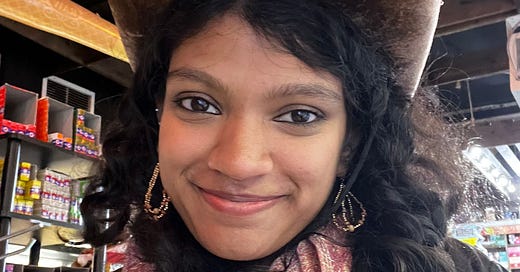📣 PSA: Apply to summer semester here. 📣
An Interview with Taco Belle
This summer, Taco and Hart are running a class to help you improve your teaching skills. Taco has been a teacher in various capacities: she's run test prep courses for high school students, tutored one-on-one, and is currently working on a reading comprehension curriculum for ages 12+.
How did you end up teaching at Fractal University?
I live at Fractal. I’ve wanted to get involved in Fractal University ever since it launched, but didn’t know what I’d want to teach. When Hart was talking about running a class for teachers, I had a lot of fun talking about it with him — after probably 4 hours of us jamming on pedagogy and how this course might be structured, he asked if I wanted to co-host a class with him. I agreed immediately, and TeachLab was born!
What’s the structure and curriculum of your class? Why did you design your class that way?
TeachLab is fundamentally cohort-based — there’ll be 10 of us in our session this summer, including Hart and myself. We’ll turn each class session over to one of us to run a “lab” for an hour: teach us whatever subject you want, however you want to do it, and we’ll be your student test-subjects. We’ll play along, take notes, do whatever you ask us to do, and then we’ll give you detailed and expansive feedback immediately.
Since we’re all teachers, we’ll be able to get into the nitty-gritty of what worked well, what could have been done better, and way more — and then we’ll take time at the end for that week’s teacher to integrate what they’ve heard and for the rest of us to reflect on how that discussion applies to our own pedagogical practices.
Often, I’ve taught a class and felt that it went pretty well, but that I probably could have done some things better. I’m left with a vague sense of what my students took away and what worked (or didn’t), but there’s no avenue by which to solicit thoughtful, actionable feedback from my students, and that makes me wary of trying unusual tactics in my classroom. TeachLab solves that. It’s experiential, not theoretical. Giving feedback is also a skill that rhymes with teaching, so participating in these discussions should also sharpen that pedagogical task. And finally, we’ll get to sample lessons from 10 creative people who are passionate about sharing their knowledge – I’m really looking forward to seeing what everybody teaches us!
What do you hope students get out of your class? How do you hope they change?
I hope they come away with a far more robust understanding of pedagogy, both as a broader subject and as it applies to their own practice. What are their best practices? What are they trying to get across, and how can they accomplish that in different settings? How can they structure their lessons to be most beneficial to their students, and for the sustainability of their practice? Do they want to teach groups, individuals, beginners, experts, workshops, courses, in the morning, over Zoom – who, how, and why? These are all questions that I hope each member of our cohort will be closer to answering by the end.
If our cohort members walk away from TeachLab feeling fired up about their ability to convey knowledge to others, I’ll consider this experiment a success.





